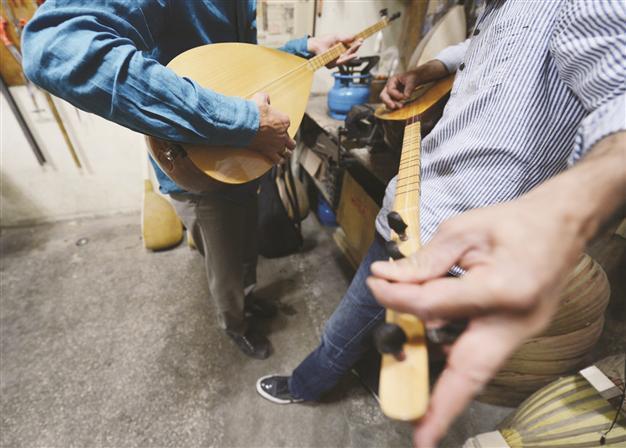Minstrels continue to sound the right note

While many people thought that the development of technology means death knell for many traditional practices in Turkey, the tradition of the minstrel (ozan), scientific advancement has transformed the art of folk bards in Sivas. AA photo
The development of technology has sounded the death knell for many traditional practices in Turkey, but far from ending the tradition of the minstrel (ozan), scientific advancement has transformed the art of folk bards in the Central Anatolian province of Sivas.
“The minstrel tradition has improved itself … because of the latest technology. Today, technology has helped this tradition become more popular. But it does not mean that the tradition went bad,” Sivas Cumhuriyet University Professor Zekeriya Kaptan said, adding that the tradition of the minstrels was a significant aspect of Turkish oral culture.
Folk bards that are members of a minstrel association in Sivas continue the tradition by visiting various festivals, weddings, ceremonies and commemorations in different parts of Turkey. The chairman of the association, Ahmet Ayık, said the minstrel tradition dated back 400 years ago and had been kept alive mostly in Kars, Erzurum and Sivas.
For centuries, Sivas has been home to the most famous minstrels, including Pir Sultan Abdal, Aşık Veysel, Kul Hüseyin and Pir Ali.
Discovering the talents of minstrels
“Our guests do not want to leave the city without seeing the talent of our minstrels. We try to keep this culture alive by organizing special nights at the association,” said Ayık.
Ayık said their association also trained apprentices in the art form, just like in the past, although he did lament that fewer people from the new generation were taking up the art form.
Kaptan, however, sounded a more positive about the future of the minstrel tradition in Sivas and further afield.
“We can say that this tradition is being maintained on the soil of Anatolia. It continues today thanks to the master/apprentice system. I am hopeful that it will continue in the future. We have new minstrels and poets and hear new sounds and melodies in our country,” Kaptan said.
Kaptan also said some features of the tradition had been altered in the modern world.
The professor also said foreigners, including Dutch people and Americans, were learning to play the saz. “This is a good impact of technology on the minstrel tradition. The association in Sivas has nearly 30 minstrels, including Aşık Şentürk, Aşık İsmeti, Aşık Erdem Can, Aşık Erkani and others. Training apprentices also makes a great contribution to the tradition.”
Aşık İsmeti, whose birth name is Abdulkadir Namlı, is one of Sivas’ oldest minstrels at 80 and is a family patriarch with eight children and 54 grandchildren.
Tradition undergoing a transformation“The minstrel tradition has not ended but has changed shape,” said Turkish folk music singer Cengiz Özkan. “It is not the same as it was in the past, but I don’t think that the minstrel tradition will come to an end.”
Özkan said Sivas was a large province in terms of surface area, adding that its districts like Şarkışla, Divriği and Zara were the home of many minstrels. “It is a region where great minstrels such as Aşık Veli and Sabri came from. We cannot see this richness in other cities. This is why Sivas is the home of minstrels.”
Minstrel Şentürk İyidoğan, who also manufactures the saz, said he was introduced to the instrument during his childhood by listening to folk bards.
He said he had been listening to Aşık Veysel since he was a child and that he was performing the works of the great bard, who died in 1973. “The minstrel tradition continues in villages. The reason why this tradition is not the same today is technological developments,” he added.
Iyidoğan, who is also known as Master Şentürk, said his next project would be to produce the world’s biggest saz to play. The saz, which will be 10 meters in length, will be introduced at an event to be held on March 21, 2014, the 41st anniversary of Aşık Veysel’s death.
